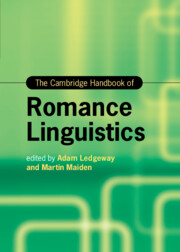Book contents
- The Cambridge Handbook of Romance Linguistics
- Cambridge Handbooks in Language and Linguistics
- The Cambridge Handbook of Romance Linguistics
- Copyright page
- Dedication
- Contents
- Figures
- Tables
- Contributors
- Abbreviations
- 1 Data, Theory, and Explanation: The View from Romance
- Part One What Is a Language?
- Part Two Phonetics and Phonology
- Part Three Morphology
- 10 Phonological and Morphological Conditioning
- 11 The Autonomy of Morphology
- 12 Suppletion
- 13 Inflexion, Derivation, Compounding
- 14 Evaluative Suffixes
- 15 Counting Systems
- Part Four Syntax
- Part Five Semantics and Pragmatics
- Part Six Language, Society, and the Individual
- Index
- References
12 - Suppletion
from Part Three - Morphology
Published online by Cambridge University Press: 23 June 2022
- The Cambridge Handbook of Romance Linguistics
- Cambridge Handbooks in Language and Linguistics
- The Cambridge Handbook of Romance Linguistics
- Copyright page
- Dedication
- Contents
- Figures
- Tables
- Contributors
- Abbreviations
- 1 Data, Theory, and Explanation: The View from Romance
- Part One What Is a Language?
- Part Two Phonetics and Phonology
- Part Three Morphology
- 10 Phonological and Morphological Conditioning
- 11 The Autonomy of Morphology
- 12 Suppletion
- 13 Inflexion, Derivation, Compounding
- 14 Evaluative Suffixes
- 15 Counting Systems
- Part Four Syntax
- Part Five Semantics and Pragmatics
- Part Six Language, Society, and the Individual
- Index
- References
Summary
This chapter uses data from a range of Romance languages to illustrate the different definitions of the notion of suppletion in the linguistic literature, and to offer a typology of suppletion (notable the difference between ‘incursive’ and phonologically induced suppletion). Suppletion may be most usefully viewed simply as an extreme contrast between unity of meaning, on the one hand, and disunity of the forms expressing that meaning, on the other. The typology and distribution of Romance suppletions is described, for example, from the numeral system, from the system of marking comparatives in adjectives, from the inflexional morphology of personal pronouns, from the inflexional morphology or verbs, nouns, and adjectives. While the Romance languages provide cross-linguistically typical illustrations of suppletion in its different manifestations, the Romance data are particularly thought-provoking with regard to, among other things, (i) the particular role of synonymy between lexemes in determining the emergence of incursive suppletion in diachrony; (ii) the role of existing abstract patterns of alternation in providing ‘templates’ for the paradigmatic distribution of suppletive alternants; and (iii) the role of phonological resemblance as a determinant of incursive suppletion.
- Type
- Chapter
- Information
- The Cambridge Handbook of Romance Linguistics , pp. 371 - 399Publisher: Cambridge University PressPrint publication year: 2022

